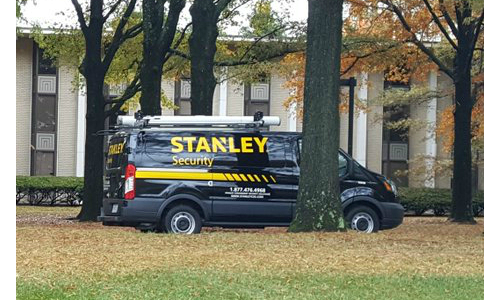Does Stanley Black & Decker Have Security Division on the Selling Block?
During a fourth-quarter earnings call with investors, executives referenced Stanley Security as “a potential asset to monetize.”

NEW BRITAIN, Conn. — Stanley Black & Decker (NYSE: SWK) on Wednesday reported better-than-expected earnings for the fourth quarter of 2019 with a $199.1 million profit. Although the quarter’s sales lagged estimates by 0.7%, the results marked the company’s fourth consecutive quarter of surpassing consensus earnings per share (EPS) estimates.
The company, based here, reported net income of $1.32 per share, after a loss of $106 million or 72 cents a share in the year-earlier period. Earnings, adjusted for costs related to mergers and acquisitions, came to $2.18 per share. This exceeded Wall Street expectations. The average estimate of eight analysts surveyed by Zacks Investment Research was for earnings of $2.16 per share.
Adjusted EPS for 2019 amounted to $8.40, an increase of 3.1% from the previous year. The company reported an operating margin rate of 13.5% (10 basis points under last year), despite absorbing $445 million of external pre-tax headwinds from tariffs and other factors.
During an earnings call with investors Wednesday, executives parsed the performance of its three operating segments — Tools & Storage, Industrial and Security — along with outlining the company’s strategic path forward.
James Loree, president and CEO, described the Stanley Security business as a “highlight from 2019.” The company has been laboring mightily to implement a value creation plan for the segment that centers on generating organic growth by converting a strong backlog into future revenue. This has entailed significant investment in digital and automation resources, the commercialization of new technology-based solutions, and particular focus on the small and medium-sized business (SMB) and healthcare markets.
“4Q was a significant step forward in the turnaround as we generated our best Security organic growth in recollection at 4%, with all major regions and businesses contributing,” Loree said. “North America electronic security was up 10%, a very encouraging indication of the power of our new business model.”
Stanley Black & Decker CFO Donald Allan forecast the security segment’s performance, with organic growth expected to be in low-single digits in 2020. In terms of profitability, the segment’s operating margin rate was 11.2%, a decline of 80 basis points compared to the prior year. He said organic growth and cost containment were more than offset by the impact from the Sargent & Greenleaf divestiture in 2019 and investments to support organic growth.
“The investments are significant and will begin to pay dividends in 2020 as the 2019 revenue impact was modest but building momentum,” Allan said. “Without the impact of these two items, Security would have experienced significant margin rate expansion.”
Signs Point to Security Segment Sale
Most intriguing from the earnings call vis-à-vis Stanley Security was the not-so-veiled inference that the segment is likely on the selling block. There were multiple references during the call for the potential to “monetize” the asset. It’s possible Stanley Black & Decker could use the cash from a sale of the security business to help fuel M&A activity to bolster its other segments.
Consider the company is aggressively growing and diversifying its industrial business. Loree said this is a priority for the company and a key element of its strategic capital deployment. “Our vision presented at our 2019 Investor Day is to create a $3 billion to $4 billion global industrial platform that is made up of highly engineered application-based solutions,” he said.
To that end, the company announced during the call it has signed an agreement with Boeing to acquire Consolidated Aerospace Manufacturing (CAM) for up to $1.5 billion. A portion of the price is contingent on Boeing’s beleaguered 737 MAX aircraft receiving FAA authorization to return to service. The buyout is anticipated to strengthen Stanley Black & Decker’s engineered fastening business within the industrial segment, while enhancing growth opportunities in the aerospace and defense market.
The deal for CAM follows a pair of other all-cash transactions that closed in 2019, both of which are intended to bolster the industrial segment. IES Attachments, a manufacturer of heavy equipment attachment tools for off-highway applications, was bought for $690 million; and, the company spent $234 million for a 20% stake in MTD Products, a global manufacturer of outdoor power equipment, with a 10-year option beginning in July 2021 to purchase the remaining 80%.
Cash may be king, but first you have to create it. Loree’s narrative that has Stanley Security positioned for “increasing positive momentum in organic growth and a stable operating margin rate poised for accretion in 2020” would seem to fit nicely into a divestiture scenario.
During the earnings call he explained the company’s longstanding capital deployment strategy is to allocate 50% of its excess capital to M&A, with 50% given back to the shareholders in the form of dividends and repurchases. Due to recent deal making, Loree said there won’t be a lot of significant M&A activity in 2020, unless something momentous comes along and forces the company’s hand to consider its options.
“And going forward, we have the Security business,” he continued, “which is a potential asset to monetize if something really down the fairway came along our way.”
If nothing breaks in the next few months, stay tuned for a midyear report on the status of the security segment, which Stanley Black & Decker has promised to provide the Street.
If you enjoyed this article and want to receive more valuable industry content like this, click here to sign up for our FREE digital newsletters!

Security Is Our Business, Too
For professionals who recommend, buy and install all types of electronic security equipment, a free subscription to Commercial Integrator + Security Sales & Integration is like having a consultant on call. You’ll find an ideal balance of technology and business coverage, with installation tips and techniques for products and updates on how to add to your bottom line.
A FREE subscription to the top resource for security and integration industry will prove to be invaluable.














